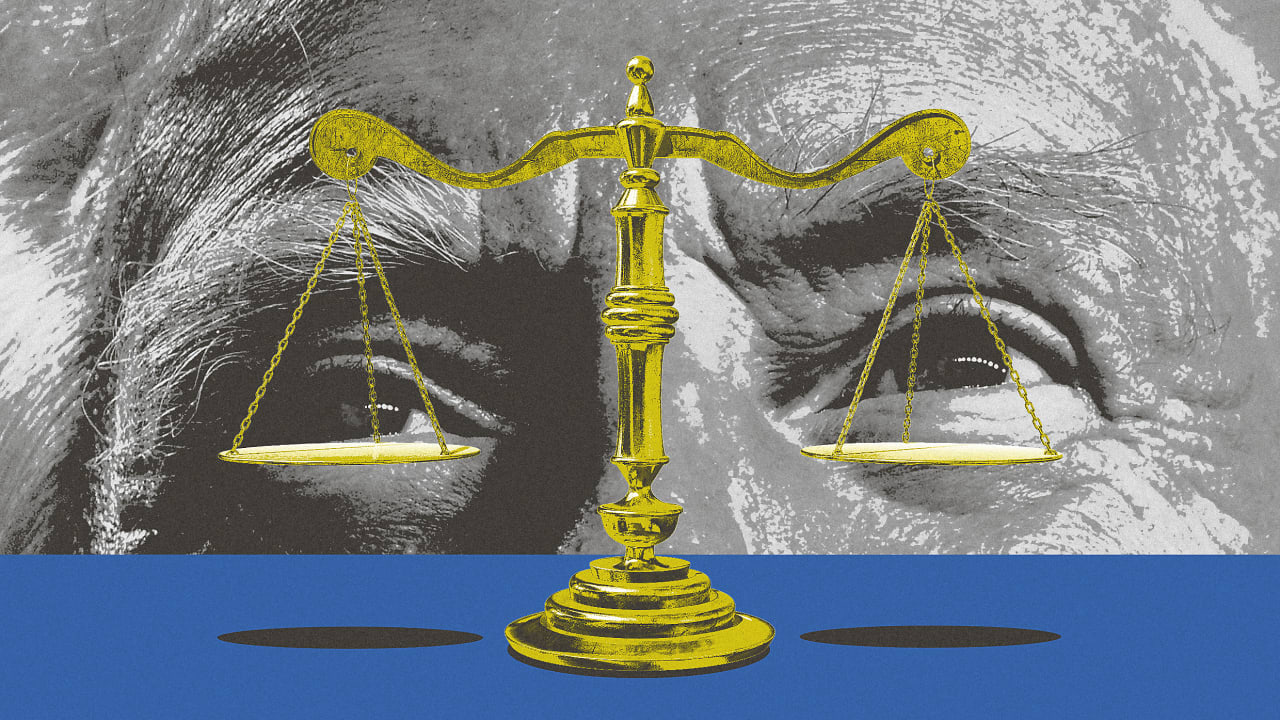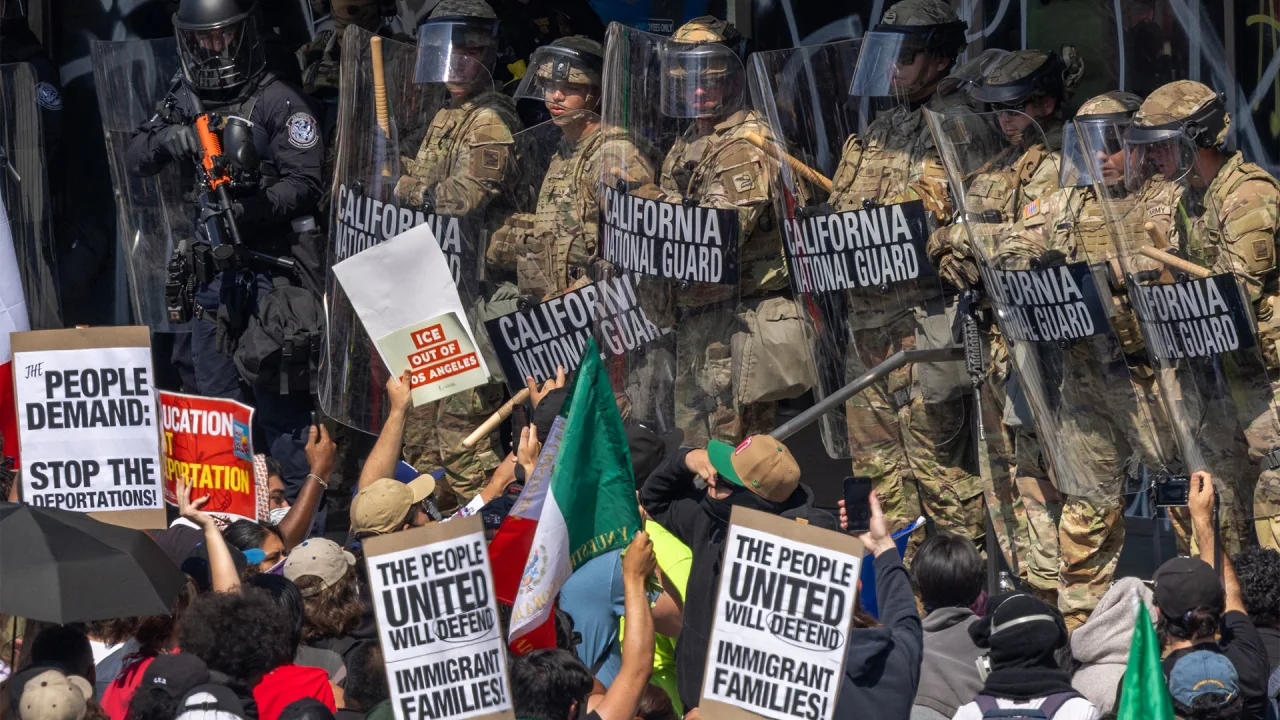Law firms have a new way to attract clients and talent: Stand up to Trump
Branded is a weekly column devoted to the intersection of marketing, business, design, and culture. Elite law firms like Paul Weiss and Jenner & Block may not advertise in traditional ways, or for a mainstream audience. But they and a handful of other prominent white-shoe firms are in the middle of an unprecedented brand test right now. At issue is how best to respond to pressure from the Trump administration and how that response affects their reputation. That has turned into a branding moment for these firms—whether they like it or not. The full verdict isn’t in yet. But those who have chosen to fight executive orders designed to punish firms that President Trump apparently dislikes seem to be faring better, scoring early legal victories and burnishing an image of bravely standing up for principle. Or maybe it’s more accurate to say that those who have cut deals with the administration (promising a collective $940 million in pro bono work) are, reputationally and perhaps substantively, faring worse: losing partners, angering some clients, and even being labeled “The Yellow-Bellied Nine” by critical peers. The test began back in March, when Trump signed a series of executive orders restricting security clearances for lawyers and employees of various firms that had represented his perceived enemies or political opponents—a move that would severely cut into their business. The prominent firm Perkins Coie, which among other things had represented Hillary Clinton’s 2016 campaign, responded by suing the administration. The order was swiftly blocked by a judge who called it “chilling.” Other targeted firms, including Jenner & Block, WilmerHale, and Susman Godfrey, have won similar blocks. Paul Weiss, one of the most storied and powerful law firms in the world, was among the first to take a different path: In exchange for the administration agreeing to lift an executive order targeting the firm, it agreed to perform $40 million in unpaid legal work for mutually agreed-upon causes and matters. The deal startled (and was immediately criticized by) many legal observers. (In a firm-wide memo, its executive chairman defended the settlement: “The resolution we reached with the Administration will have no effect on our work and our shared culture and values.”) Lately, Paul Weiss has made headlines for losing several high-profile attorneys, including the cochair of its litigation group, who left with three other partners to form their own firm, and a former U.S. attorney who went to Jenner & Block, which has sued the administration. Eight more major firms—including Skadden, Kirkland & Ellis, Simpson Thacher, and Latham & Watkins—cut similar deals. Many others have remained above the fray, declining, for example, to join an amicus brief in support of Perkins Coie or others fighting the administration in court. Law firms are often paid to help mitigate risk, but in this case some may have underestimated the risk of brand damage. In the latest sign of tangible reputational fallout, The Wall Street Journal recently reported that “at least 11” major companies, including Oracle and Morgan Stanley, are withdrawing business from firms that cut deals to get executive orders lifted or that are otherwise supporting the government in what some view as an effort to warp the legal system. As one client cited by The Journal put it: We prefer to work with law firms willing to fight. More broadly, the divergent response to the executive orders continues to draw scrutiny and controversy within the profession, with the potential to affect both recruiting and retention. Above the Law, a snarky but serious online publication popular with younger lawyers, coined the “Yellow-Bellied Nine” moniker, and has introduced a “Spine Index” that rates major firms’ responses to the executive orders (and notes, in addition, those that have scrapped DEI efforts). A survey of its readers found that a vast majority supported firms fighting the orders, and felt that “law firms who make agreements with the administration are giving in to extortion, which sends a bad message to the entire profession.” Still, while the firms fighting back have been winning new clients and winning in the courts (so far), it’s hard to gauge how that will ultimately affect their business: Clients who would rather steer clear of potential trouble with Trump aren’t likely to be very public about distancing themselves from the conflict. Meanwhile, as Above the Law has noted, neither the administration nor the firms that agreed to deals involving pro bono promises have offered up much detail or any sense of timing about those commitments. For Trump, that may be a matter of biding time; for the firms, it may be in hopes that the matter will fade from the court of public opinion.

Branded is a weekly column devoted to the intersection of marketing, business, design, and culture.
Elite law firms like Paul Weiss and Jenner & Block may not advertise in traditional ways, or for a mainstream audience. But they and a handful of other prominent white-shoe firms are in the middle of an unprecedented brand test right now. At issue is how best to respond to pressure from the Trump administration and how that response affects their reputation. That has turned into a branding moment for these firms—whether they like it or not.
The full verdict isn’t in yet. But those who have chosen to fight executive orders designed to punish firms that President Trump apparently dislikes seem to be faring better, scoring early legal victories and burnishing an image of bravely standing up for principle. Or maybe it’s more accurate to say that those who have cut deals with the administration (promising a collective $940 million in pro bono work) are, reputationally and perhaps substantively, faring worse: losing partners, angering some clients, and even being labeled “The Yellow-Bellied Nine” by critical peers.
The test began back in March, when Trump signed a series of executive orders restricting security clearances for lawyers and employees of various firms that had represented his perceived enemies or political opponents—a move that would severely cut into their business. The prominent firm Perkins Coie, which among other things had represented Hillary Clinton’s 2016 campaign, responded by suing the administration. The order was swiftly blocked by a judge who called it “chilling.” Other targeted firms, including Jenner & Block, WilmerHale, and Susman Godfrey, have won similar blocks.
Paul Weiss, one of the most storied and powerful law firms in the world, was among the first to take a different path: In exchange for the administration agreeing to lift an executive order targeting the firm, it agreed to perform $40 million in unpaid legal work for mutually agreed-upon causes and matters. The deal startled (and was immediately criticized by) many legal observers. (In a firm-wide memo, its executive chairman defended the settlement: “The resolution we reached with the Administration will have no effect on our work and our shared culture and values.”)
Lately, Paul Weiss has made headlines for losing several high-profile attorneys, including the cochair of its litigation group, who left with three other partners to form their own firm, and a former U.S. attorney who went to Jenner & Block, which has sued the administration.
Eight more major firms—including Skadden, Kirkland & Ellis, Simpson Thacher, and Latham & Watkins—cut similar deals. Many others have remained above the fray, declining, for example, to join an amicus brief in support of Perkins Coie or others fighting the administration in court.
Law firms are often paid to help mitigate risk, but in this case some may have underestimated the risk of brand damage. In the latest sign of tangible reputational fallout, The Wall Street Journal recently reported that “at least 11” major companies, including Oracle and Morgan Stanley, are withdrawing business from firms that cut deals to get executive orders lifted or that are otherwise supporting the government in what some view as an effort to warp the legal system. As one client cited by The Journal put it: We prefer to work with law firms willing to fight.
More broadly, the divergent response to the executive orders continues to draw scrutiny and controversy within the profession, with the potential to affect both recruiting and retention. Above the Law, a snarky but serious online publication popular with younger lawyers, coined the “Yellow-Bellied Nine” moniker, and has introduced a “Spine Index” that rates major firms’ responses to the executive orders (and notes, in addition, those that have scrapped DEI efforts).
A survey of its readers found that a vast majority supported firms fighting the orders, and felt that “law firms who make agreements with the administration are giving in to extortion, which sends a bad message to the entire profession.”
Still, while the firms fighting back have been winning new clients and winning in the courts (so far), it’s hard to gauge how that will ultimately affect their business: Clients who would rather steer clear of potential trouble with Trump aren’t likely to be very public about distancing themselves from the conflict.
Meanwhile, as Above the Law has noted, neither the administration nor the firms that agreed to deals involving pro bono promises have offered up much detail or any sense of timing about those commitments. For Trump, that may be a matter of biding time; for the firms, it may be in hopes that the matter will fade from the court of public opinion.








































































![https //g.co/recover for help [1-866-719-1006]](https://newsquo.com/uploads/images/202506/image_430x256_684949454da3e.jpg)

























![[PATREON EXCLUSIVE] The Power of No: How to Say It, Mean It, and Lead with It](https://tpgblog.com/wp-content/uploads/2025/06/just-say-no.jpg?#)





















































